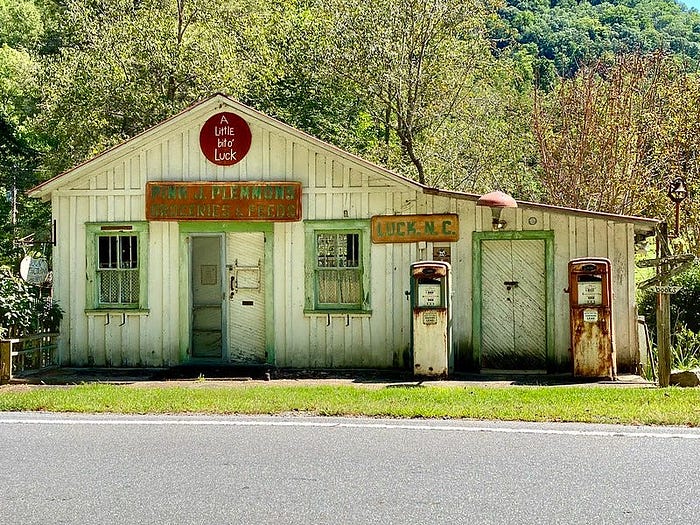It was a rainy Friday night in February 1901 in the village of Emma, NC, three miles west of Asheville. Five men were on a collision course. Three would leave with gunshot wounds. Two would die. Sometime between 8:00 and 9:00 pm, Samuel Alexander closed D.J. McClelland’s store, which also housed the Emma Post Office, for the night.
Alexander had worked there as a store clerk and assistant postmaster for three years. He boarded with the McClelland family and slept in a small room in the rear of the store.
He heard someone at the back door, he went, called through the door, and asked what they wanted. A man answered, saying he wanted to buy coffee and flour. After-hours customers were not unusual.
Alexander opened the door about a foot and saw the barrel of a .44 caliber Smith & Wesson revolver. Two masked men pushed their way into the store: a black man named Ben Foster and a white man named Frank Johnson.
“We have come for business, and you must obey orders,” Johnson said.
They searched Alexander, taking his change purse and a check. They herded him toward his room, and he said:
“You fellows are going to get into trouble.”
“You keep your damned mouth shut,” Johnson replied.
In his room, they found Alexander’s pistol, which they took.
The men wanted him to unlock the post office desk. Alexander told them that the owner had the key. They were more interested in the store safe anyway.
Alexander said he didn’t know the combination. Johnson drew a knife and threatened to cut his throat. Reluctantly, he opened the safe.
A Cat Intervenes
Johnson put Alexander’s revolver down on top of the safe and stooped down to open a locked partition inside. Foster covered Alexander with his gun.
In the back of the store, a cat jumped down from a shelf to the floor.
Foster turned to see what made the noise, and Alexander saw an opportunity. He reached past Johnson, grabbed the gun off the safe, and shot Foster center mass, the bullet passing just below the heart. Foster staggered back against the counter.
Johnson tackled Alexander and grappled with him for the gun. The revolver broke open, spilling cartridges. Alexander managed to swing the cylinder back into the gun, pressed it into his assailant, and pulled the trigger rapidly.
It clicked repeatedly. The gun was empty.
Foster dragged himself up to the struggling men, pressed his gun against Alexander, and fired. The bullet passed just below his ribs and came out near his spine.
Johnson slashed at him with a knife, and Alexander grabbed the blade, severely cutting his hand. He saw Foster aim the gun at him again, and with all of this remaining strength, he spun Johnson around, putting the man between him and Foster.
Foster fired, hitting Johnson. The bullet struck his left shoulder and ranged upward, lodging in his right jaw.
Both men attacked Alexander, driving him against the counter. Foster placed the big revolver against Alexander’s temple and pulled the trigger three times. Three clicks. Foster then used the gun as a club.
Somehow, Alexander got loose, pulled himself along the counter to the door, and called loudly for help using the Odd Fellows’ signal of distress. He fell and lay in the doorway.
Foster and Johnson decided to make their exit, stepping over his prone form. Before the fleeing bandits reached the foot of the steps, a shot rang out from the darkness, narrowly missing Alexander. He heard multiple men running down the railroad track.
Moments later, the owner, McClelland, and a neighbor, J. F. Ingle, came to his assistance.
The Capture
Foster and Johnson had two accomplices who stood guard outside the store: R. S. Gates and Henry Mills. It’s unclear how the four got back to Asheville, where they were staying in two boarding houses in a disreputable neighborhood near the train depot called “Scratch Ankle.”
They made multiple attempts to hire a hack (a horse-drawn buggy that served as the taxi or Uber of the day) to transport the two wounded men, which drew attention to them. At least two hack drivers found the men suspicious and refused them service.
Having been alerted by a phone call about the robbery, Captain F. M. Jordan and officers Taylor and Collins of the Asheville Police tracked down the men, arrested them, took them to the city jail, and got doctors to treat the two wounded men. The quartet was rounded up before 3:00 am, less than six hours after the crime.
Alexander’s abdominal wound was severe, and for several days, it was uncertain if he would survive. He was supposed to wed Laura Penland the following week, but at her insistence, they were married in the store on Sunday.

Lynching Fears
It was feared that if Alexander died, the men might be lynched. Foster and Mills were black, so there may have been a racial component to the desire to storm the jail and punish the Emma robbers.
Additionally, it came to light that the men appeared to be behind a string of recent street robberies.
The lynching rumors became so intense and so general that the men were moved to the county jail, and Sheriff R. F. Lee telegraphed Governor Charles B. Aycock, who placed two military companies at Lee’s disposal: the Blue Ridge Rifles and the Asheville Light Infantry. The units took turns guarding the jail.
Alexander, through his father, contacted the Asheville Daily Citizen, asking that the public refrain from violence, saying “it is his wish that the law take its course in respect to the robbers.”
Once it became clear that Alexander would not be strong enough to testify until the next term of court, Foster, Johnson, Gates, and Mills were quietly shipped to the Mecklenburg County jail for safekeeping.
On March 26, while in custody at the Mecklenburg County jail, Ben Foster attacked another inmate, Giles Gaffney, with a chair leg, fracturing his skull. Early reports said Gaffney was not expected to survive. A later news item stated that his condition was improving.
For the rest of the story, click on the link below:
Blue Ridge True Crime on Substack
Also, check out my book, Blood on the Blue Ridge: Historic Appalachian True Crime Stories 1808–2004, co-written by my friend and veteran police officer, Scott Lunsford, on Amazon. Download a free sample chapter here!
Sources
STATE v. FOSTER, Supreme Court of North Carolina, December 23, 1901
Arthur, John Preston. Western North Carolina: A History from 1730 to 1913. Asheville, NC, Edward Buncombe Chapter of the Daughters of the American Revolution, 1914, pp. 307–308.
Asheville Gazette, Saturday, February 9, 1901, Page 5, “Desperate Robbery by Masked Men”
Asheville Citizen, Monday, February 11, 1901, Page 1, “Young Alexander Takes His Bride”
Asheville Semi-Weekly Citizen, Friday, February 15, 1901, Page 3, “Military Companies Called Out and Many Deputies Summoned by Sheriff”
Charlotte Observer, Wednesday, March 27, 1901, Page 5, “Dangerous Fight in Jail”

